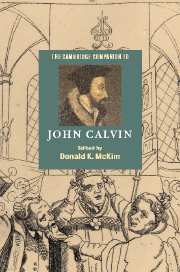Book contents
- Frontmatter
- Part I Calvin’s Life and Context
- Part II Calvin’s Work
- 3 Calvin’s writings
- 4 Calvin as a biblical interpreter
- 5 Calvin’s theology
- 6 Calvin’s ethics
- 7 Calvin’s preaching
- 8 Calvin on piety
- 9 Calvin and social-ethical issues
- 10 Calvin and political issues
- 11 Calvin’s controversies
- Part III After Calvin
- Part IV Calvin Today
- Select bibliography
- Index
8 - Calvin on piety
from Part II - Calvin’s Work
Published online by Cambridge University Press: 28 May 2006
- Frontmatter
- Part I Calvin’s Life and Context
- Part II Calvin’s Work
- 3 Calvin’s writings
- 4 Calvin as a biblical interpreter
- 5 Calvin’s theology
- 6 Calvin’s ethics
- 7 Calvin’s preaching
- 8 Calvin on piety
- 9 Calvin and social-ethical issues
- 10 Calvin and political issues
- 11 Calvin’s controversies
- Part III After Calvin
- Part IV Calvin Today
- Select bibliography
- Index
Summary
John Calvin's Institutes have earned him the title of “the preeminent systematician of the Protestant Reformation.” His reputation as an intellectual, however, is often seen apart from the vital spiritual and pastoral context in which he wrote his theology. For Calvin, theological understanding and practical piety, truth, and usefulness are inseparable. Theology first of all deals with knowledge - knowledge of God and of ourselves - but there is no true knowledge where there is no true piety.
Calvin’s concept of piety (Lat. pietas) is rooted in the knowledge of God and includes attitudes and actions that are directed to the adoration and service of God. In addition, his pietas includes a host of related themes, such as filial piety in human relationships, and respect and love for the image of God in human beings. Calvin’s piety is evident in people who recognize through experiential faith that they have been accepted in Christ and engrafted into his body by the grace of God. In this “mystical union,” the Lord claims them as his own in life and in death. They become God’s people and members of Christ by the power of the Holy Spirit. This relationship restores their joy of fellowship with God; it re-creates their lives.
- Type
- Chapter
- Information
- The Cambridge Companion to John Calvin , pp. 125 - 152Publisher: Cambridge University PressPrint publication year: 2004
- 17
- Cited by

